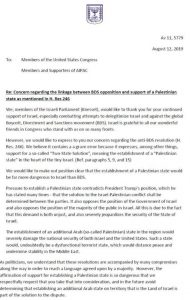21 Israeli lawmakers sent a letter to members of the US House of Representatives on Monday, thanking them for their recent resolution against the boycott, divestment & sanctions (BDS) movement but explaining that the resolution’s endorsement of Washington’s tradition “two-state solution” is harmful.
The letter argued that the repercussions of partitioning the Land of Israel into two separate states would be “far more dangerous for Israel” than BDS campaigns.
The House had overwhelmingly approved Resolution 246 against boycotts of the State of Israel on July 23.
350 legislators, 175 Democrats and 175 Republicans, cosponsored the resolution opposing the BDS movement, “including efforts to target United States companies that are engaged in commercial activities that are legal under US law, and all efforts to delegitimize the State of Israel.”
The bill, however, also reaffirmed strong support “for a negotiated solution to the Israeli-Palestinian conflict resulting in two states.”
The letter from Israeli lawmakers argued that while some sectors of the American Jewish Diaspora promote the “two-state solution” as a pro-Israel policy, the actual will of the Israeli people and the current policy of Israel’s government do not reflect that attitude.
“We would like to make it clear that the recent resolution of the Congress against BDS (Resolution 246) is a grave mistake because it also expresses support for the so-called ‘two-state solution’, establishing a ‘Palestinian state’ at the heart of the tiny Land of Israel,” the letter read.
“The establishment of an additional Arab (so-called Palestinian) state in the region would severely damage the national security of both Israel and the United States.”

“Such a state would undoubtedly be a dysfunctional terrorist state, which would distance peace and undermine stability in the Middle East,” the letter continued.
“The affirmation of support for establishing a Palestinian state is so dangerous that we respectfully request that you take that into consideration, and in the future avoid determining that establishing an additional Arab state on territory that is the Land of Israel is part of the solution to the dispute.”
Samaria Regional Council head Yossi Dagan, author of the letter and a powerful organizer within Israel’s ruling Likud party, attributed some blame to the American Israel Public Affairs Committee (AIPAC) for the resolution’s support for partition.
“Unfortunately, in the last few years, AIPAC is independently advancing the two-state solution,” said Dagan.
“AIPAC portrays the two-state concept as an Israeli interest to elected officials in America and as the official position of the Israeli government, even though this is untrue. The two-state concept is not the policy of the current government coalition, nor is it stated as policy in the agreements between the coalition partners.”
While Dagan is correct in challenging AIPAC’s relevance and in asserting that the two-state policy would constitute a greater threat to Israel than BDS campaigns (which don’t actually pose any threat at all), the letter itself is problematic for a number of reasons.
To start, the letter focuses its opposition to partition on the harm dividing the land would do to Israel’s security rather than on the Jewish people’s unwillingness to relinquish the cradle of our civilization. “Security” is not a legitimate reason to resist partition unless we have a deep connection and loyalty to the lands the international community demands Israel surrender.
Next, the letter perpetuates the generic pro-Israeli versus pro-Palestinian paradigm by denying the existence of Palestinian identity and citing that Palestinians are only capable of creating a “dysfunctional terror state” as the reason American officials should oppose the creation of a Palestinian state. Even if this were to be true, it would still not be a legitimate reason for withholding political independence from an indigenous people willing to fight for it.
Stronger and less divisive arguments against Palestinian statehood would have been that the nation-state construct isn’t central to Palestinian aspirations, that it was always at best a means to an end, that a majority of Palestinians reject the two-state paradigm, that a growing number support a democratic and equal one-state solution, that a Palestinian state under Fatah would just be another autocratic American puppet regime in the region, that forcibly segregating the Jewish and Palestinian populations would make peace between peoples even harder to achieve, that each people is connected to the both sides of the green line, or simply that the Jewish people demand our entire land be free from foreign rule – an argument more in line with the true reason Dagan and his allies oppose a Palestinian state.
A similar misstep the letter takes is its attempt to appeal to US interests in the Middle East. This is a classic Zionist mistake of toadying to imperialist powers by trying to convince them that supporting Jewish national interests will somehow benefit their agendas. Such an approach only reinforces, on an international scale, systemic anti-Semitism and the middle agent oppressor role capitalism forces Jews into.
What actually motivates Dagan and the lawmakers objecting to partition is a sense of Jewish history and connection to their homeland – understanding themselves to be part of an unjustly displaced ancient people that somehow managed to return home against all odds several centuries later. For Dagan and his parliamentary allies, opposition to the “two-state solution” has little to do with preventing a “terror state” and even less with serving American regional interests. It’s about preventing the Jewish people from ever again being displaced by the forces of empire. That’s our real story and the one we should be telling.
The most problematic feature of the letter is a subtext that legitimizes the notion of Washington having any say over what takes place in our land. Instead of putting forward arguments to convince American leaders to let Israel keep the West Bank, Jews who care to protect our homeland should join the fight to attain full Israeli independence from the United States.
Even if a particular US administration or house of congress were to refrain from pressuring Israel to surrender land, there’s no guarantee that their successors will share their positions. The desire for a more sympathetic power structure in Washington debases the people of Israel and betrays the political naiveté of our leaders. We shouldn’t seek a better emperor but demand our nation’s freedom, because so long as the Jewish people accept American dominance over Israeli government policies, Eretz Yisrael won’t ever be safe.





